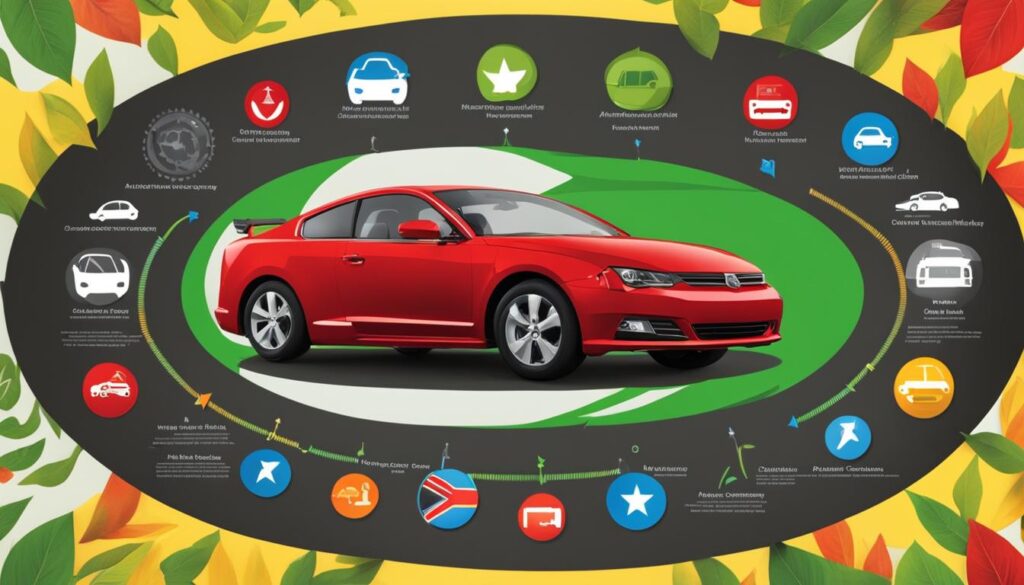When it comes to car insurance in New Zealand, it is not mandatory, but it is highly recommended due to the common occurrence of road accidents. While car insurance is not compulsory, it is worth considering due to the safety risks on the roads, with 40% of highways having a two-star safety rating. This rating indicates hazardous conditions such as undivided opposing lanes, poor alignment, narrow or unsealed shoulders, and roadside objects. To protect yourself and your vehicle, it is essential to understand how car insurance works in New Zealand and the different types of coverage available.
Key Takeaways:
- Car insurance in New Zealand is not compulsory but highly recommended.
- Understanding the risks of accidents and damages on the roads is crucial.
- Knowing how car insurance works and the types of coverage available is essential.
- Comparing quotes from different insurance providers can help find the best coverage.
- Understanding the conditions of your car insurance policy is crucial for accurate coverage.
Is Car Insurance in New Zealand Compulsory?
Car insurance is not compulsory in New Zealand. However, it is highly recommended to have car insurance to protect yourself from potential accidents and damages on the roads. While it is not mandated by law, having car insurance can provide you with peace of mind knowing that you are financially covered in case of an accident.
Although car insurance requirements in New Zealand do not make it mandatory, it is important to consider the safety concerns associated with driving. Road accidents can occur at any time, and the costs of repairing or replacing a vehicle can be substantial. Insurance coverage can help alleviate the financial burden and ensure that you have the necessary support when you need it most.
While you may be a cautious driver, accidents can happen due to factors beyond your control. Unforeseen circumstances such as severe weather conditions, reckless drivers, or vehicle malfunctions can lead to accidents and damages. Without car insurance, you may find yourself facing significant expenses for repairs, medical bills, or legal costs.
Protecting Yourself and Others
Car insurance not only provides protection for yourself but also for others who may be involved in an accident with you. It covers damages to other vehicles and property, as well as any possible injury claims. Without insurance, you may be personally liable for these costs, which can quickly add up and potentially put you in a difficult financial situation.
Having car insurance also allows you to access the support and resources provided by insurance companies. This includes assistance with arranging repairs, facilitating claims, and providing guidance throughout the process. Insurance companies have the expertise to handle complex situations and can help protect your interests.
It is important to note that car insurance requirements may vary depending on the lender if you have financed your vehicle. Some lenders may require you to have comprehensive insurance to safeguard their investment. Make sure to check your financing agreement for any specific insurance requirements.
Peace of Mind and Financial Security
Having car insurance gives you peace of mind and financial security. In the event of an accident, you can focus on the well-being of yourself and others involved, knowing that the financial aspect is taken care of. Car insurance ensures that you are not burdened with unexpected expenses that can potentially disrupt your life and financial stability.
Investing in car insurance is a responsible decision that prioritizes your safety, the safety of others, and protects your financial well-being. Even though it is not compulsory, it is highly recommended to have adequate car insurance coverage in New Zealand.
| Type of Insurance | Description |
|---|---|
| Comprehensive Insurance | Covers damage to your own vehicle as well as damage to other vehicles and property. |
| Third-Party Fire and Theft Insurance | Covers damage caused by fire and theft to your vehicle, as well as damage to other vehicles and property. |
| Third-Party Only Insurance | Covers damage to other vehicles and property, but does not cover damage to your own vehicle. |
Consider the different types of car insurance coverage available and choose the one that best suits your needs and budget. Remember, having car insurance provides you with the necessary protection and peace of mind on the roads, ensuring that you are financially prepared for any unforeseen circumstances.
Types of Car Insurance in New Zealand
In New Zealand, there are different types of car insurance coverage available to protect you and your vehicle. Understanding these options is crucial for selecting the right policy that suits your needs and budget.
1. Comprehensive Insurance
Comprehensive insurance is the most extensive coverage option, providing financial protection for both your own vehicle and other people’s vehicles and property. This type of insurance is ideal for those seeking maximum coverage and peace of mind. In the event of an accident, comprehensive insurance covers the cost of repairs for your own vehicle, as well as any damage caused to third-party vehicles and property.
2. Third-Party Fire and Theft Insurance
Third-party fire and theft insurance offers coverage for specific risks such as fire and theft. This type of insurance protects your vehicle from damage caused by fire or instances of theft, while also covering any damage caused to other people’s vehicles and property in the event of an accident. Third-party fire and theft insurance provides a good balance between coverage and affordability.
3. Third-Party Only Insurance
Third-party only insurance is the most basic form of car insurance coverage in New Zealand. It provides protection for damage caused to third-party vehicles and property in the event of an accident. However, it does not cover any damage to your own vehicle. Third-party only insurance is typically more affordable than comprehensive or third-party fire and theft insurance, making it a popular choice for budget-conscious individuals.
Choosing the right type of car insurance coverage in New Zealand depends on your individual needs, preferences, and budget. Consider the level of coverage you require and weigh it against the associated premiums. To make an informed decision, compare the benefits and limitations of each type of insurance policy offered by different providers.
| Type of Car Insurance Coverage | Coverage Details |
|---|---|
| Comprehensive Insurance | Provides coverage for damage to your own vehicle as well as other people’s vehicles and property. |
| Third-Party Fire and Theft Insurance | Covers damage caused by fire and theft to your vehicle, as well as damage to other people’s vehicles and property. |
| Third-Party Only Insurance | Covers damage to other people’s vehicles and property, but does not cover damage to your own vehicle. |
By carefully considering your needs and budget, you can select the car insurance policy in New Zealand that provides the appropriate level of coverage and peace of mind.

Car Insurance Providers in New Zealand
When it comes to car insurance in New Zealand, there are several reputable providers that offer a range of coverage options for drivers. It is important to compare different insurance companies to find the best coverage and rates that suit your needs. Some of the top car insurance providers in New Zealand include:
- AA Insurance
- State Insurance
- Tower Insurance
- Vero Insurance
- AMI Insurance
Each of these companies has its own unique offerings, including comprehensive insurance, third-party fire and theft insurance, and third-party only insurance. Before choosing a provider, it is important to carefully consider the coverage, premiums, and customer reviews to ensure that it aligns with your requirements.
Comparing car insurance providers in New Zealand allows you to make an informed decision and find the best policy for your specific needs. It is recommended to explore the coverage options, compare premiums, and read customer reviews to gauge the overall satisfaction and reliability of each provider.
Comparison of Car Insurance Providers in New Zealand
| Insurance Provider | Comprehensive Insurance | Third-Party Fire and Theft Insurance | Third-Party Only Insurance |
|---|---|---|---|
| AA Insurance | Yes | Yes | Yes |
| State Insurance | Yes | Yes | Yes |
| Tower Insurance | Yes | Yes | Yes |
| Vero Insurance | Yes | Yes | Yes |
| AMI Insurance | Yes | Yes | Yes |
By evaluating factors such as coverage availability, customer support, and pricing, you can select the best car insurance provider in New Zealand that aligns with your needs and preferences.
Understanding Your Car Insurance Policy
Before purchasing car insurance in New Zealand, it is essential to understand the details of the policy. This includes knowing the terms and conditions, coverage limits, excess amounts, and any additional benefits or add-ons.
When you receive your car insurance quotes in New Zealand, carefully review the policy documents to ensure that the coverage meets your needs. Pay attention to the specific terms and conditions outlined in the policy, as they will dictate what is covered and what is not.
Understanding the coverage limits is crucial. This refers to the maximum amount your insurance company will pay for a covered claim. If your coverage limits are too low, you may end up having to pay out-of-pocket for damages that exceed the limit.
The excess amount is the portion of the claim that you are responsible for paying. It is important to familiarize yourself with the excess amount specified in your policy, as it can vary depending on the type of coverage and the insurance provider.
Additionally, take note of any additional benefits or add-ons offered by your insurance provider. These may include options like roadside assistance, rental car coverage, or windshield repair. Evaluating these extras can help you decide if they are worth adding to your policy.
When comparing car insurance quotes in New Zealand, consider not only the premiums but also the level of coverage offered by each provider. Cheaper premiums may indicate lower coverage limits or fewer benefits, so it’s important to strike a balance between cost and coverage.
Finally, be on the lookout for any discounts or promotional offers that may be available from different insurance providers. These can help you lower your overall premium while still maintaining adequate coverage.
Key Points to Remember:
- Review the terms and conditions of your car insurance policy.
- Understand the coverage limits and excess amounts.
- Take note of any additional benefits or add-ons offered.
- Compare car insurance quotes in New Zealand, considering both premiums and coverage.
- Look for discounts or promotional offers to lower your premium.
By understanding your car insurance policy and comparing quotes, you can make an informed decision that provides the protection you need at a price you can afford.
Here is a helpful table summarizing key elements of car insurance policies:
| Coverage Element | Explanation |
|---|---|
| Coverage Limits | The maximum amount your insurance company will pay for a covered claim. |
| Excess Amount | The portion of the claim that you are responsible for paying. |
| Terms and Conditions | The specific guidelines and requirements outlined in your car insurance policy. |
| Additional Benefits/Add-ons | Extra features or coverage options available with your car insurance policy. |
| Premiums | The cost of your car insurance policy. |

Agreeing to a Fair Value of Your Vehicle
When purchasing car insurance in New Zealand, one important aspect to consider is agreeing to a fair value of your vehicle. This value will determine the amount you will be compensated for in the event of an accident or damage to your car. Typically, the fair value of a vehicle can be determined through two methods: market value and agreed value.
Market value: This refers to the estimated value of your car on the market at the time of the accident or damage. Insurance companies will consider various factors such as the make, model, year, condition, and mileage of your car to determine its market value. It is important to note that the market value can fluctuate over time due to market conditions and other factors.
Agreed value: On the other hand, an agreed value is a predetermined amount that you and your insurance provider agree upon. This value remains fixed throughout the duration of your policy, regardless of any changes in market conditions or depreciation. It provides a sense of certainty and allows you to know exactly how much you will be compensated for in the event of a claim.
It is crucial to thoroughly understand the valuation methods used by insurance companies and ensure that the fair value assigned to your vehicle is appropriate. Be aware of any additional conditions or requirements that may affect the valuation process. By agreeing to a fair value of your vehicle, you can have peace of mind knowing that you will be fairly compensated in the event of an accident or damage.
As illustrated by the image above, properly assessing the fair value of your car is crucial in the car insurance valuation process. It ensures that you are adequately protected and reimbursed in the event of an unfortunate incident.
Knowing the Difference Between Comprehensive and Third Party Insurance
When it comes to car insurance in New Zealand, it’s crucial to understand the difference between comprehensive insurance and third-party insurance. Comprehensive insurance provides coverage for both damage to your own car and damage to other people’s vehicles and property. On the other hand, third-party insurance only covers damage to other people’s vehicles and property.
Comprehensive car insurance offers extensive protection by covering a wide range of scenarios. In addition to providing coverage for damage to your own vehicle, it also safeguards you from potential financial liabilities resulting from accidents involving other vehicles or property. This comprehensive coverage brings peace of mind, knowing that you are financially protected in case of any unexpected incidents.
On the contrary, third-party car insurance offers a more basic level of coverage. It protects you from potential expenses arising from damaging other people’s vehicles or property, but it does not cover your own vehicle. This type of insurance is typically more budget-friendly, making it a suitable option for those seeking basic protection while keeping costs down.
Choosing between comprehensive and third-party insurance depends on several factors, such as your needs, budget, and level of risk tolerance. If you have a newer or more valuable vehicle, comprehensive insurance might be the better option as it provides broader coverage and greater peace of mind. However, if you have an older or less expensive vehicle, third-party insurance may be a more cost-effective choice.
Ultimately, it’s essential to carefully evaluate your specific situation and weigh the pros and cons of both comprehensive and third-party insurance before making a decision. Consider factors such as the value of your vehicle, your driving habits, and your financial capabilities to determine the type of coverage that best suits your needs.
| Comprehensive Insurance | Third-Party Insurance |
|---|---|
| Covers damage to your own vehicle | Does not cover damage to your own vehicle |
| Covers damage to other people’s vehicles and property | Covers damage to other people’s vehicles and property |
| Offers broader coverage | Provides more basic coverage |
| Greater peace of mind | More budget-friendly option |
| Suitable for newer or more valuable vehicles | Suitable for older or less expensive vehicles |
Insuring the Driver vs. Insuring the Vehicle
When purchasing car insurance in New Zealand, you are faced with a crucial decision: should you insure the driver or the vehicle? The choice you make can have a significant impact on your coverage and premiums.
If you opt to insure the driver, your insurance coverage will extend to any vehicle that the driver operates. This means that if you have multiple cars or frequently borrow or rent vehicles, insuring the driver can provide you with a more comprehensive level of protection. Whether you’re driving your own car or someone else’s, you can have peace of mind knowing that you’re covered in case of an accident or damage.
On the other hand, insuring the vehicle means that the coverage is specific to the insured vehicle, regardless of who is driving it. This option may be more suitable if you have a designated car and only a limited number of drivers. By insuring the vehicle, you can ensure that your specific car is protected, regardless of who is behind the wheel.
When deciding whether to insure the driver or the vehicle, it’s essential to evaluate your driving habits and consider the number of drivers who will be using the car. If you frequently drive different vehicles or have multiple drivers in your household, insuring the driver may provide the flexibility and coverage you need. On the other hand, if you have a dedicated car and a limited number of drivers, insuring the vehicle may be a more suitable choice.
The Importance of Driver Profiles
When insuring the driver, insurance companies take various factors into account to determine your premiums. These factors include:
- Age
- Driving experience
- Driving history
- Claims history
Insurance companies evaluate these driver profiles to assess the level of risk associated with insuring the driver. Younger drivers or those with a history of accidents or traffic violations may be considered higher risk and may face higher premiums.
On the other hand, when insuring the vehicle, insurance companies generally assess the make, model, and age of the car, as well as its security features, to determine the level of risk. Vehicles with advanced safety features and a lower likelihood of theft or damage may be associated with lower premiums.
Insuring the driver provides flexibility and coverage across different vehicles, while insuring the vehicle ensures specific protection for your car, regardless of the driver. Consider your driving habits and the number of drivers before making a decision on how to insure your car.
Insuring the Driver vs. Insuring the Vehicle
| Aspect | Insuring the Driver | Insuring the Vehicle |
|---|---|---|
| Flexibility | Provides coverage across multiple vehicles | Specific protection for the insured vehicle |
| Number of Drivers | Can cover multiple drivers | Limited to designated drivers |
| Premium Determinants | Driver profiles (age, experience, history) | Vehicle characteristics (make, model, age) |
| Cost Considerations | May be more expensive for higher-risk drivers | Can be influenced by the vehicle’s safety features |
Ultimately, the choice between insuring the driver and insuring the vehicle depends on your specific circumstances and needs. Take the time to carefully evaluate your driving habits, the number of drivers, and your budget to determine the best option for you.
Understanding the Conditions of Your Car Insurance Policy
Before purchasing car insurance in New Zealand, it is important to carefully read and understand the conditions of the policy. This includes knowing exactly what is covered and what is not covered, as well as any exclusions or limitations. It is also crucial to be aware of any additional conditions, such as requirements for reporting accidents or damage, and the process for making a claim. Taking the time to understand the conditions of your car insurance policy can help prevent any surprises or frustrations in the event of an accident or damage.
Knowing Your Coverage
When reviewing the conditions of your car insurance policy, it is essential to have a clear understanding of what is covered. This includes damage to your vehicle, liability for damages to other parties, and any additional benefits or add-ons that may be included. Be aware of any deductibles or excess amounts that you are responsible for in the event of a claim.
Exclusions and Limitations
It is equally important to be aware of any exclusions or limitations in your car insurance policy. These are specific situations or circumstances in which the insurance coverage may not apply. Common exclusions may include driving under the influence of alcohol or drugs, using the vehicle for illegal activities, or participating in unauthorized races or competitions. Limitations can include restrictions on coverage for certain types of vehicles or drivers, or limitations on the coverage amount for specific types of damage.
Claims Process
Understanding the process for making a claim is crucial in order to navigate the claims process smoothly. Familiarize yourself with the steps you need to take in case of an accident or damage, such as reporting the incident to your insurance company within a specified timeframe. Take note of any required documentation, such as police reports or repair estimates, that may be needed to support your claim. Being prepared and knowing the claims process can help expedite the resolution of your claim.
It is always recommended to clarify any doubts or questions you may have about the conditions of your car insurance policy with your insurance provider. They can provide you with the necessary information and guidance to ensure that you fully understand your coverage and obligations.
| Key Points: | Benefits: |
|---|---|
| Understanding what is covered and what is not | Prevents surprises or frustrations in the event of an accident or damage |
| Awareness of exclusions and limitations | Helps you avoid situations where your coverage may not apply |
| Knowing the claims process | Facilitates a smooth and expedited resolution of your claim |
By understanding the conditions of your car insurance policy, you can make informed decisions and be prepared for any situation that may arise. Take the time to review and familiarize yourself with the fine print of your car insurance policy to ensure that you have the coverage you need and know exactly what to expect in the event of an accident or damage.
Conclusion
In conclusion, while car insurance is not mandatory in New Zealand, it is highly advisable to have it due to the potential risks on the roads. Understanding how car insurance works, the various coverage options available, and the specific conditions of your policy is crucial to safeguarding yourself and your vehicle. By comparing quotes from different insurance providers and carefully evaluating your needs and budget, you can find the best car insurance coverage to suit your specific requirements.
Having car insurance provides peace of mind, knowing that you are financially protected in the event of an accident or damage. It offers a layer of security against unexpected expenses that may arise from repairs or legal liabilities. Although it may not be a legal requirement, car insurance is a responsible choice for anyone driving on New Zealand roads.
Take the time to read and understand the terms and conditions of your car insurance policy, including any exclusions, limitations, or additional requirements. This will help you navigate the process of making a claim and avoid any surprises or frustrations down the line. Remember, car insurance is an important investment in your safety and the protection of your valuable asset.
FAQ
Is car insurance in New Zealand compulsory?
No, car insurance is not compulsory in New Zealand. However, it is highly recommended to protect yourself and your vehicle from potential accidents and damages.
What are the types of car insurance available in New Zealand?
The most common types of car insurance in New Zealand are comprehensive insurance, third-party fire and theft insurance, and third-party only insurance.
Which car insurance providers are available in New Zealand?
Some of the top car insurance companies in New Zealand include AA Insurance, State Insurance, Tower Insurance, Vero Insurance, and AMI Insurance.
How can I understand the conditions of my car insurance policy?
It is important to carefully read and understand the details of your car insurance policy, including the terms and conditions, coverage limits, excess amounts, and any additional benefits or add-ons.
How do I agree to a fair value of my vehicle for car insurance purposes?
When purchasing car insurance in New Zealand, you can choose either the “market value” or “agreed value” of your vehicle. The market value is the estimated value of your car on the market, while the agreed value is a predetermined amount agreed upon between you and your insurance provider.
What is the difference between comprehensive and third-party insurance?
Comprehensive insurance covers damage to your own vehicle as well as damage to other people’s vehicles and property. Third-party insurance only covers damage to other people’s vehicles and property.
Should I insure the driver or the vehicle?
You have the option to either insure the driver, which extends coverage to any vehicle they operate, or insure the vehicle itself, regardless of who is driving it. Consider your driving habits and the number of drivers using the vehicle before making a decision.
What should I consider when comparing car insurance quotes in New Zealand?
When comparing car insurance quotes, consider the coverage, premiums, and any discounts or promotional offers that may be available from different insurance providers.
What do I need to know about the conditions of my car insurance policy?
It is important to understand exactly what is covered and what is not covered, as well as any exclusions, limitations, reporting requirements, and the process for making a claim.
Is car insurance in New Zealand mandatory?
No, car insurance is not compulsory in New Zealand. However, it is highly recommended to protect yourself from potential accidents and damages on the roads.




